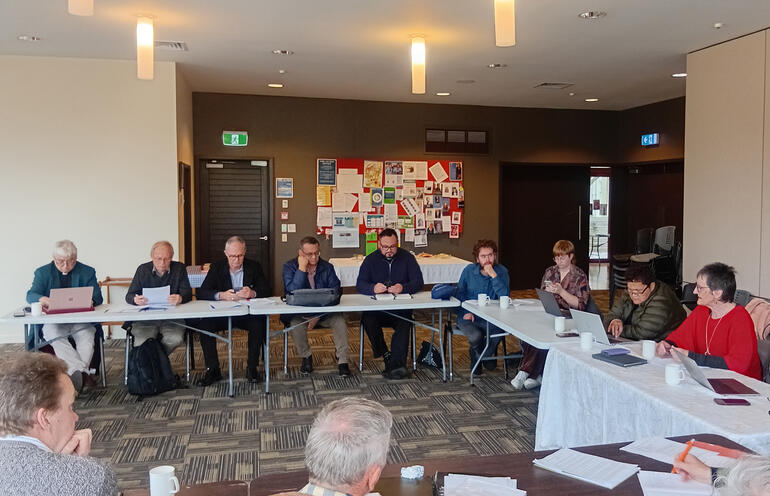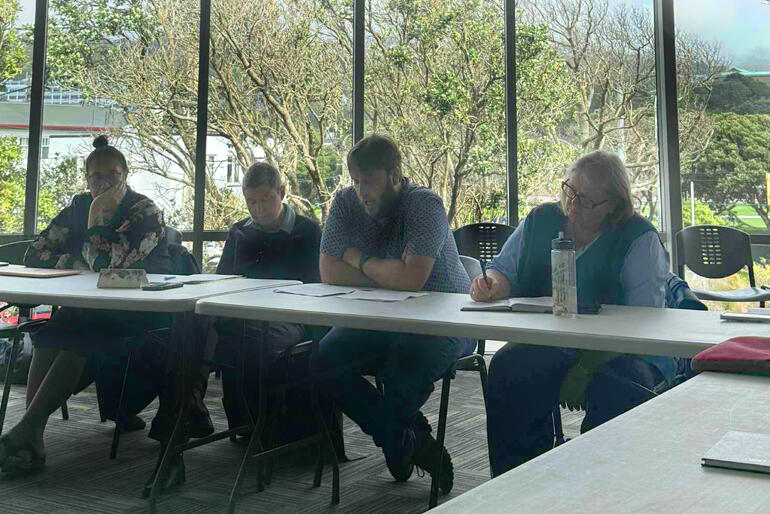

Members of the National Dialogue for Christian Unity received a challenging presentation on right-wing extremism in Aotearoa New Zealand at their meeting this 10 October.
Anglican, Catholic, Methodist, Presbyterian, Religious Society of Friends (Quaker), Salvation Army and ecumenical organisation representatives heard from online extremism researcher Byron Clark, who outlined evidence of Christian nationalism and other forms of violent extremism present in Aotearoa.
Vicar of Howick and Interfaith relations specialist, the Rev Ivica Gregurec said the message needs to arrive as a wake-up call to the whole church.
"We cannot assume that by living in Aotearoa New Zealand we live in a silo. Byron's talk was a stark reminder that instead of mocking other countries, we have a lot to clean up in our own front yard. There's no immunity to radicalism and extremism."
Clark outlined how some organisations and individuals present in Aotearoa New Zealand are promoting extremist theories that attempt to justify racism, and demonise Government and non-Christian people. Among them are a vocal minority that use their church networks to fuel extremist positions including: antisemitism, Islamophobia or violent homophobia.
Rt Rev Rose Luxford (who has been the chair of NDCU while Moderator of the Presbyterian Church of Aotearoa from 2023-2025) believes the talk showed we live in an increasingly polarised world, and that within our churches we can see a wide range of views and outlooks.
"This can be difficult and painful for many within the church when they see fellow Christians espousing very different political views. Some feel that others are 'using' God in ways to legitimise a political world view that is inconsistent with the ways of Jesus."
Clark reported his research has shown that mosques in Aotearoa approach the problem face on, employing methods of deradicalisation when they identify a congregant expressing extremist views.
He suggested that church communities could learn how to recognise individuals who have been radicalised online, as they may enter churches equipped with extremist ideologies masked as faith.
Rt Rev Rose Luxford agreed,
"Churches do need to be more aware of extremist elements. When churches are in relationship with each other, across denominations, information and views can be shared and I believe that is very helpful as we navigate our way through the constantly changing world in which we live."
Byron Clark quoted author Christopher Lamb who said that in Europe, “The populists and nationalists were looking for some kind of soul for their politics and they found it in some symbols of the faith.”
He also turned to a Canadian Catholic researcher, David Lafferty, who describes this phenomenon as “Catholic LARPing,” (Live Action Role-Playing) where individuals adopt the trappings of Catholicism, but not the actual tenets of the faith, such as mercy, compassion, peace, or the Golden Rule.(Matt 7:12)
Church leaders heard how some independent churches in Aotearoa New Zealand had actively spread US-imported propaganda, designed to drum up anxiety and fear of immigrants and gender diverse people.
Bardia Matiu agrees that the Anglican Church needs to become more aware of how individuals who have been effected by extremists ideas need community support.
"Amongst the other important church safeguarding matters, having a position and process on identifying and managing extremist Christian ideology in our church and the potential harm it can cause is a pathway for the church leadership." he said.
Bardia shared how in some iwi contexts, radicalised individuals within the tribe had received wrap-around support to de-escalate their extremist views.
"That's one example of a collective effort to eradicate harmful behaviour and counter ill-informed theology." he said.
Bardia also asked a question for the wider church.
"Where is the apologetics discourse within the church, if an apologetics exists, that defends Christian thought from radical Christian nationalism and extremist ideology?"
The Aotearoa New Zealand National Dialogue for Christian Unity (NDCU) meeting in Wellington also received reports and welcomed representatives from national ecumenical organisations, including the Christian Disability Network, Christian World Service, InterChurch Tertiary Chaplaincy Board and Student Christian Movement Aotearoa.
Dr Susan Thompson reported from her participation in the Executive Committee of the World Council of Churches(WCC) and the Rev Keita Hotere from her role on the Programme Committee of the Christian Conference of Asia(CCA).
Rev Hana Popea presented a proposal to celebrate an annual feast of God the Creator within the existing Season of Creation and Bishop Te Kitohi Pikaahu’s report on the Joint Working Group Between the Roman Catholic Church and the World Council of Churches was presented by Rev’d Ivica Gregurec.
In an acknowledgement of the 1700th anniversary of the Council of Nicaea, Dr. Te Aroha Rountree, President of the Methodist Church presented “Nicaea i te Ao Māori”, reflecting on Māori theological perspectives reinterpreting the Nicene Creed within the context of contemporary Methodism in Aotearoa New Zealand.
The National Dialogue for Christian Unity meeting this October included Anglican delegates: Rev Canon Michael Hughes, Bardia Matiu, Rev Ivica Gregurec and Ven Dr Michael Wallace and Anglican observers from Student Christian Movement Aotearoa, Jesse Malcolm-Stone and Chris Hawkins and from the Disability Spirituality and Faith Network Aotearoa New Zealand, Rev Murray Wills.
The Aotearoa New Zealand National Dialogue for Christian Unity (NDCU) brings together representatives of the Anglican, Catholic, Methodist, Presbyterian and Religious Society of Friends (Quaker) churches as well as observers from the Salvation Army and ecumenical organisations. Founded in 2014, the NDCU aims to deepen relationships between and build ecumenical co-operation between churches in Aotearoa New Zealand. The NDCU is the successor body to the National Council of Churches in New Zealand (1941-1989) and the Conference of Churches in Aotearoa New Zealand (1989-2005). In 1982 the member churches of the Māori section of the National Council of Churches in New Zealand decided formed their own, autonomous council of churches - Te Runanga Whakawhanaunga I nga Hahi o Aotearoa, which today the NDCU seeks to work with in partnership.
NDCU meeting reporting from: Ven Dr Michael Wallace.

















Comments
Log in or create a user account to comment.